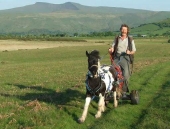posted 9 years ago
I agree with Suzanne about the Shetland ponies. They are immensely strong and very hardy. I would not ask them to plough. For that you need 3 large heavy horses like Shires, Clydesdales or Percherons. Two work at a time on a single share plough with the third one being used to spell the others in turn. These large horses will be sweating and blowing hard after ploughing 100 yards of clay soil. They would be totally uneconomical for a small homestead. In olden days they would work the farm year round, ploughing, harrowing, rolling, sowing, carting manure to be spread on fields, harvesting, taking produce to market etc. and would usually have Sunday off. A pair of shetlands could harrow land that had been ploughed, pull a small roller and a small sowing machine. But as others have said, it would be difficult to find scaled down machinery to fit them. They could also pull a small trap and provide transport if local roads are quiet. They ate good for helping to clear scrubby ground, as they can eat much coarser herbage than most equines. They can live out with supplementary feed in cold winters but would be better stabled. Then you will need bedding as well as fodder. And it takes a lot of experience to keep and train any equine. So many people bought ponies during the Celtic Tiger here and many were badly neglected due to lack of knowledge. So unless you have an acre you can use for grazing and turnout, separate from your growing area, I don't think any equines are very suitable for Permaculture, unless you already have experience and could stack functions by running courses on using equines on the land and maybe also organising picnic drives or such for hire. I know someone who has his son's jumping pony pulling a beautiful buggy to bring brides to church for weddings. I have seen so many horses and ponies abused by people with insufficient knowledge. They are long suffering animals and will put up with years of abuse. . .

 3
3




![Filename: Screen-Shot-2016-04-10-at-3.17.32-PM.png
Description: [Thumbnail for Screen-Shot-2016-04-10-at-3.17.32-PM.png]](/t/30565/a/38454/Screen-Shot-2016-04-10-at-3.17.32-PM.png)
 1
1




































 1
1




 3
3











